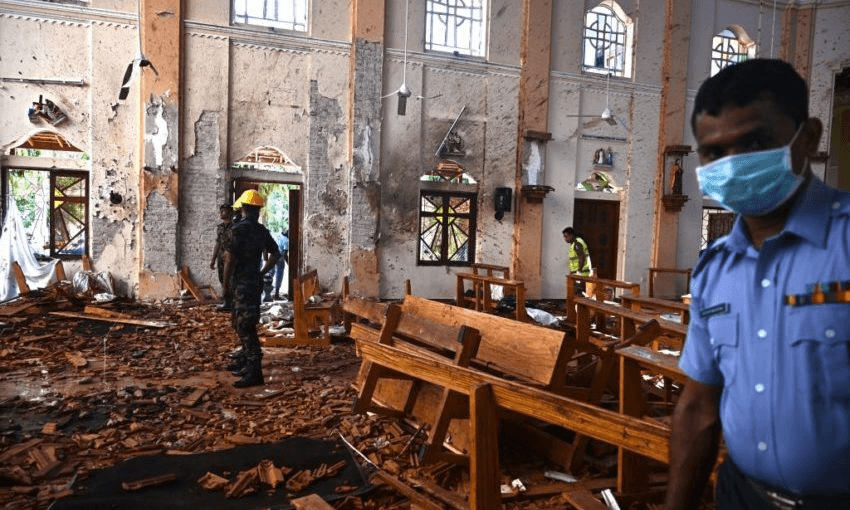ISIS and a junior defence minister in the Sri Lankan government have asserted the terrorist attacks on churches and hotels were a response to the attack on mosques in Christchurch on 15 March. The claims need to be treated with scepticism, writes security analyst Paul Buchanan in this post originally published at RNZ
Having been defeated on the battlefields of the Levant, ISIS now urges its followers to return to decentralised terrorist attacks as a form of irregular warfare. It wishes to show continued strength by claiming that it can orchestrate attacks world-wide and that no country can escape its reach. The Easter Sunday terrorist bombings in Sri Lanka fit that narrative.
The truth is otherwise. The Sri Lankan attacks may have taken inspiration, and perhaps even logistical support from ISIS but planning and preparation began well before 15 March. They occurred against a backdrop of rising violence against both Muslims and Christians in Sri Lanka by Buddhist militants, the real motive for the Easter attacks. These were not random or foreign in origin, but represent a violent response by one oppressed minority using terrorism against another minority and tourists in order to make a sharp point to the constitutionally empowered majority that it sees as increasingly oppressive in nature (70 percent of Sri Lankans practise Buddhism, which is the official religion of the country and which has constitutionally protected privileges.)
Christians were the targets because they were left unprotected by an indifferent or incompetent government, while tourists were attacked because the country depends on them for hard currency revenues. Neither targeted group were the real subject of the attacks, nor was the objective of the attacks strictly about them.
Operationally speaking, the effort to engage in coordinated, simultaneous attacks against multiple soft targets using significant quantities of explosives and involving at least seven suicide bombers requires months of target surveillance, stockpiling and concealment of bomb-making ingredients, manufacture of human-portable bombs, coordination and communication between perpetrators and accomplices and logistical support in at least three cities, all under the veil of secrecy.
That simply could not happen in the month after the Christchurch attacks. Moreover, the Sri Lankan security services were warned several times before 15 March that Muslim extremists were preparing to launch attacks, followed by specific information two weeks ago that Catholic churches were being targeted on Easter. The complexity of the attacks and the repeated warnings strongly suggest that ISIS’s claims are opportunistic rather than truthful.
Likewise, the uncorroborated claim by a Sri Lankan junior minister that Christchurch was the reason for the atrocities appears to be a reckless attempt to deflect attention away from the gross negligence that led to the intelligence “failure” that facilitated them. In an atmosphere of rising ethnic and religious tensions, the Sri Lankan government received repeated, specific warnings and yet did nothing. It did not increase security around churches and hotels and did not seek to pre-emptively arrest suspects on various extremist watch lists.
Instead, weakened by partisan infighting and weighed down by incompetence, the security forces cast a negligent eye on what was going to happen. That may be because the attacks could serve as an excuse to crack down on the Muslim community, something Buddhist hardliners have been seeking for some time. Whatever the reason, it was not an intelligence “failure” that facilitated the attacks. The security services knew, or at least were warned about what was going to happen. They either could not or chose not to act.
In truth, ISIS and some Sri Lankan government interests converged in making Christchurch part of the narrative. Falsely claiming that the attacks were revenge for Christchurch makes it seem as if they are part of a larger struggle in which Sri Lanka is a pawn. The reality is more simple: the attacks were a local Islamist response to increased ethno-religious conflict in Sri Lanka in recent years, which itself is part of a larger struggle within South Asia between Buddhists, Hindus and Muslims.
Therein lies the danger of the false narrative. It feeds into the “clash of civilisations” argument put forward by ideological extremists that the world is in the midst of an cultural and religious conflict in which only one side can win. Subscribing to this argument justifies so-called “tit for tat” responses, whereby an attack by one side leads to an attack by the other, creating a cycle of violence that is designed to spiral into an existential confrontation between antithetical “others.” Although the vast majority of religionists the world over are non-violent and tolerant of other beliefs, this is the apocalyptic vision that extremists want to propagate.
The antidote is to place responsibility where it belongs and to not buy into false opportunistic narratives about revenge-based existential conflict. Sometimes, the blame for atrocities lies closer to home, both in terms of root causes and inadequate responses.

